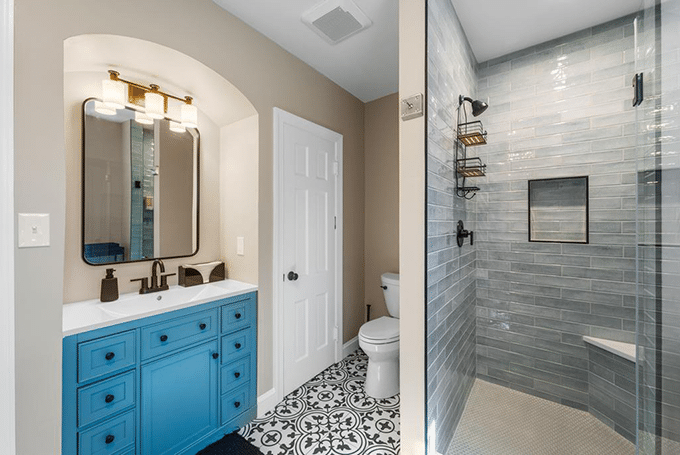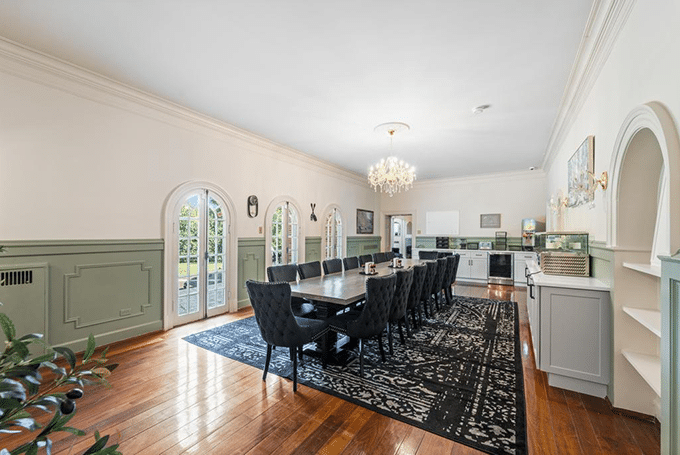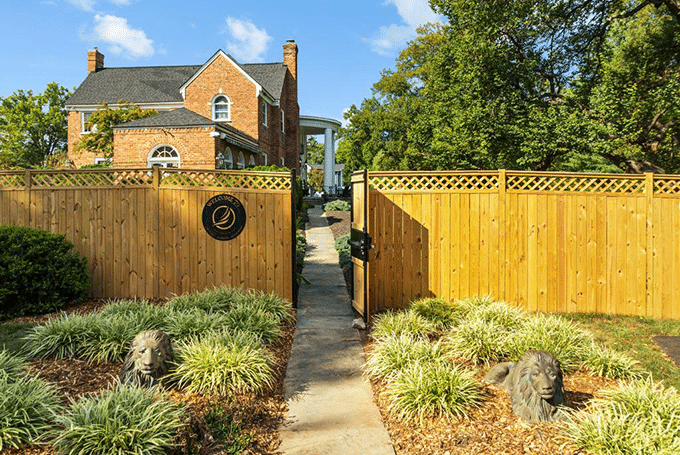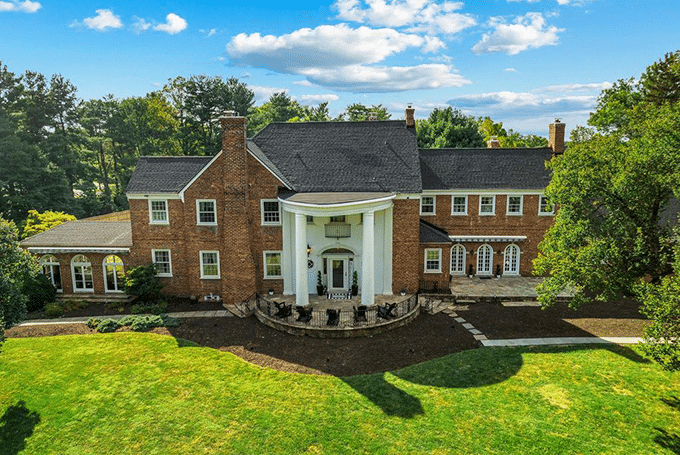Home / Brookeville
Brookeville Rehab for Men
Discover comprehensive inpatient care at our eight-bed men’s rehab program in Brookeville, Maryland. Offering a supportive environment for men facing substance use and co-occurring disorders, our home-like setting gives you the space to be honest, build trust, and connect with peers who understand the unique challenges men face in addiction and recovery.
The Freedom Center Maryland Drug & Alcohol Rehab
Tour The Men’s Facility






About Our Brookeville Location
Our Brookeville men’s addiction treatment facility is situated in a beautiful house in the heart of a quiet Maryland neighborhood, offering a warm and welcoming atmosphere that fosters connection, healing, and growth. With eight beds, outdoor walking trails, and communal areas, our facility is uniquely positioned to address the specific challenges men face in addiction while fostering trust and accountability.
We offer several levels of care at our inpatient rehab for men, including:
Inpatient Residential Treatment
Focusing on continued therapeutic support and peer connection, this less-intensive residential care prepares patients for a smooth transition into the next phase of recovery.
Intensive Outpatient Program
This highly structured, immersive men’s rehab program provides round-the-clock support, intensive therapy, and 24/7 care in a residential setting, helping patients remain stable and focused on long-term recovery.
Therapy and Programs We Offer
We offer a comprehensive array of evidence-based therapies and holistic treatment methods, customized to address each individual’s specific needs. Our treatment approaches and specialized programs encompass:
Individual Therapy
Many men struggle to open up about the emotions and experiences driving their addiction, often feeling they must solve problems alone. Individual therapy creates a private, judgment-free space where men can be honest without fear of appearing weak. Our therapists use evidence-based techniques to help men identify triggers, set realistic recovery goals, and develop coping skills. By addressing the root causes of addiction, including suppressed emotions, trauma, or stress, individual therapy empowers men to rebuild their lives with strength and resilience.
Group Therapy
Many men battling addiction carry the burden of silence, hiding their struggles to maintain the image of strength. Group therapy provides a space where men can connect with peers who understand the weight of those expectations. It allows them to safely talk about stigma, anger, and vulnerability without fear of judgment. Our group sessions typically follow guided discussions on relapse prevention, stress management, and emotional regulation, giving men both connection and practical tools for recovery.
Family Therapy
Men often feel pressure to be the “rock” of the family, which can make admitting the damage caused by addiction especially painful. Family therapy helps men confront these challenges and rebuild trust with loved ones in a setting that encourages honesty and accountability. Sessions guide both the individual and their family members to identify enabling behaviors, learn healthier patterns of support, and restore relationships damaged by addiction.
Cognitive Behavioral Therapy (CBT)
For many men, emotional suppression and “toughing it out” have been lifelong habits. CBT helps men break this cycle by teaching practical strategies to challenge unhealthy thought patterns and face emotions instead of burying them. This approach equips men with actionable skills for managing stress, overcoming cravings, and preventing relapse, while fostering healthier ways of thinking.
Dialectical Behavior Therapy (DBT)
Men in recovery often struggle with anger, emotional regulation, and difficulty trusting others. DBT addresses these challenges by teaching individuals to develop stress tolerance, mindfulness, and effective communication skills. This therapy empowers men to understand their emotions better and replace destructive behaviors with healthier coping mechanisms, all while reinforcing that seeking balance and calm is a sign of strength.
Dual Diagnosis Treatment
Men frequently self-medicate depression, anxiety, or trauma through substance use rather than seeking help, a cycle fueled by stigma around men’s mental health. Dual diagnosis treatment tackles both conditions at once, addressing the hidden pain behind addiction. By treating mental health disorders alongside substance abuse, men gain a more straightforward path to long-term recovery and emotional stability.
Holistic Therapy
Men often carry stress physically as well as mentally. Holistic therapy provides outlets that connect the body and mind, helping men find healthier ways to cope with pressure. Through mindfulness, meditation, nutrition, and exercise, men learn sustainable practices that support their recovery journey and strengthen resilience.
Yoga Therapy
For many men, yoga introduces a new way of connecting with their bodies while learning patience and discipline. By combining movement, breathwork, and mindfulness, yoga therapy helps men release tension, reduce stress, and improve focus — all while fostering a deeper sense of self-awareness and calm.
Art therapy
Men who struggle to put their emotions into words often find freedom in creative expression. Art therapy gives men a nonverbal outlet to explore anger, grief, or vulnerability, helping them process emotions they may have suppressed for years. This creative approach fosters healing and self-discovery beyond traditional talk therapy.
Music therapy
Music therapy provides men with a powerful means to break through barriers of silence and emotional suppression. Whether through listening, creating, or discussing music, men can process complex emotions, reduce stress, and build meaningful connections. It helps them safely access feelings that might otherwise remain unspoken.
Daily Routine at Brookeville
At our Brookeville facility, each day in our men’s rehab program is thoughtfully structured to blend therapeutic activities with opportunities for personal reflection and connection. Morning wellness checks, followed by either group or individual therapy sessions, provide accountability, while fireside chats and outdoor activities offer men the opportunity to share openly and form healthy relationships with their peers. The daily routine also includes community activities, dedicated time for rest, and nutritious meals. This carefully designed environment aims to minimize everyday distractions while creating a rhythm of accountability and connection, which helps men feel grounded, understood, and supported in recovery.

Benefits of Inpatient Rehab for Men
Inpatient drug rehab for men provides support to patients to help them recover from addiction and fully immerse themselves in their treatment program without distractions or daily stress.[1] Some of the key benefits of inpatient rehab for men include:
A structured and supportive environment where individuals can focus on recovery in a safe, substance-free setting. This environment fosters routine, eliminating daily triggers and distractions, and allows patients to concentrate on their healing journey alongside others facing similar challenges.
Patients benefit from 24/7 medical and emotional support, with constant access to professionals who can address prolonged withdrawal symptoms or medical complications, and provide crucial emotional guidance during the early stages of recovery.
Treatment plans include various approaches of intensive therapy, such as group therapy for peer support, individual therapy, behavioral therapy to address unhelpful patterns contributing to substance abuse, and family therapy to mend relationships affected by addiction.
Furthermore, inpatient rehab for men is an ideal setting for men with co-occurring mental health disorders like anxiety, depression, or PTSD, which can complicate men’s addiction treatment. The program also emphasizes peer support and community, encouraging accountability through group interactions and activities. Patients often develop significant, lasting friendships with fellow individuals in recovery, which can be invaluable as they transition back to daily life.
Are Gender-Specific Rehab Programs Effective?
The short answer is yes, gender-specific programs can be more effective at lasting addiction treatment than mixed-gender programs. Several studies have shown promising results for women-only programs, especially, and there are studies that show how beneficial men’s rehab programs can be for addiction. More research is being conducted to understand the impact of these programs on recovery. [2] Men typically feel comfortable and more at ease among other men they can relate to, which leads to stronger relationships with their peers and fewer chances of relapse after treatment.
Rehab for men at The Freedom Center means that patients are surrounded by men who are just like them, struggling with addiction and co-occurring disorders. They understand what you’re going through, and you are free to be open and honest with them. While in inpatient rehab for men, they aren’t under the scrutiny of societal pressures to be unfeeling and invulnerable; they can talk about their trauma and their struggles that led them to substance abuse.
Community is vital to the recovery process, and at The Freedom Center, we encourage our patients to participate in activities together outside of therapy and treatment, allowing them to build a supportive community among those who are going through the same experience.
Start Recovery Today
Our admissions team is available to discuss the comprehensive inpatient programs and personalized therapies available to you at The Freedom Center. Let us guide you through the next steps.
Frequently Asked Questions About Our Brookeville Rehab for Men
The length of stay in drug and alcohol rehab varies based on your specific needs and treatment plan, but the average stay at our Brookeville men’s rehab is 21 days.
It’s actually quite common to feel this way! A lot of men feel nervous about sharing in therapy. At the Brookeville men’s rehab center, you’ll be surrounded by a small group of peers who understand what it’s like to carry heavy burdens and keep emotions bottled up. Our therapists create a safe, judgment-free space where you can share at your own pace without any pressure to be strong or to feel a certain way – just the support you need to express yourself, no matter what that looks or sounds like.
Many men find it easier to be honest about struggles they’re facing in addiction and in recovery when they’re not worried about pressure to “appear strong” around others. In our men’s-only program, you can speak openly with peers who can relate to what you’re going through. You’ll feel a sense of camaraderie that builds trust, accountability, and lifelong friendships that continue long after you leave treatment.
Relapse doesn’t mean you’re a failure! It means you’re still fighting for recovery. Our program is designed for men who may have struggled in the past, especially those who may have tried treatment in a co-ed environment and relapsed. Smaller group sizes, individualized care, and a strong peer support system can help you identify what didn’t work before and build a new path forward in recovery.
Inpatient treatment includes residential care, where patients stay overnight at the treatment facility for a designated period, as outlined in their treatment plan. This is typically recommended for patients who would benefit from a more structured environment and constant medical supervision. Outpatient treatment is more flexible, allowing patients to receive treatment at the facility as needed while continuing to live at home and work, attend school, and manage other daily responsibilities. Many men begin with inpatient care at The Freedom Center and later step down by referral to outpatient treatment at The Freedom Center in Gaithersburg or programs at another treatment location to continue building on their recovery progress.
Yes, healthy family relationships are an important part of the healing process. Family visitation is typically arranged during designated periods, as outlined in the patient’s treatment plan. We know how important it is for family support and involvement during addiction recovery, and encourage loved ones to participate in our family therapy sessions to facilitate healing as the family unit learns how to move forward together in recovery.
Continued treatment after inpatient rehab for men is essential for long-term recovery. Patients may continue to receive care by transferring either to one of our outpatient programs in Gaithersburg or to a sober living home. Patients may also choose to participate in one of our aftercare programs, depending on their current recovery needs. Our team will help you create a personalized plan as you transition from residential treatment to outpatient programming at another location or to aftercare, ensuring ongoing support and accountability. You’re never alone on the next step of your healing journey!
The Freedom Center accepts most major insurance plans and offers flexible payment options for our treatment programs. We believe finances should never stand in the way of getting help. If insurance doesn’t cover your treatment or you don’t have insurance, we will work with you to find a solution and ensure you receive the necessary treatment.
The Freedom Center is true to its name, offering a rehab facility where patients are free to come and go. While Brookeville is not a lockdown facility, those in our men’s inpatient rehab programs are encouraged to remain on site during their treatment period to avoid the risk of dangerous relapse. We want you to feel safe, respected, and trusted as you focus on healing.
Due to HIPAA privacy laws and because focus is crucial in early recovery, cell phones and laptops are typically not allowed in residential treatment at Brookeville. However, we do understand that some men may have special circumstances requiring personal electronic access for work-related needs. Exceptions can be made on a case-by-case basis, as our goal is to balance your recovery needs with your responsibilities outside of treatment.
Our patients stay in semi-private rooms, sharing them with one to two other patients. While we do not currently offer private rooms, many men find comfort in living alongside peers in treatment. Sharing this journey fosters connection and builds accountability, both of which are essential components of recovery.
Residential treatment centers for addiction, including The Freedom Center’s Brookeville location, typically establish rules to foster accountability and support recovery. These rules commonly include mandatory therapy attendance, punctuality, and a strict prohibition of substance use or violence on the premises. Ask your admissions advisor about any other regulations that are specific to the treatment center or your unique situation. Rules are not about restriction; they’re about building structure, responsibility, and respect to help you thrive in recovery.
Sources
[1] Institute of Medicine (US) Committee for the Substance Abuse Coverage Study. (1990, January 1). The effectiveness of treatment. Treating Drug Problems: Volume 1: A Study of the Evolution, Effectiveness, and Financing of Public and Private Drug Treatment Systems. Retrieved from https://www.ncbi.nlm.nih.gov/books/NBK235506/ on 2025, July 30.
[2] Treatment, C. F. S. A. (2013). Treatment modalities and settings. Addressing the Specific Behavioral Health Needs of Men – NCBI Bookshelf. Retrieved from https://www.ncbi.nlm.nih.gov/books/NBK144286/ on 2025, August 15.



































